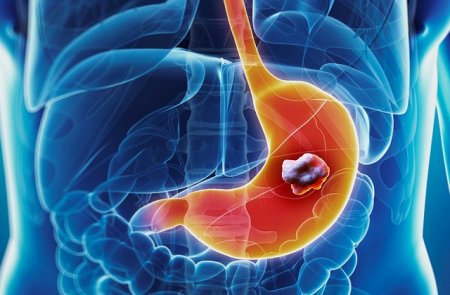P
PressRoom
Guest
Have you heard of Stomach Cancer before now? Who does it affect? Where is it prevalent? Who is more at risk of Stomach cancer? Below is a list of of 13 things you should know about Stomach Cancer.

---
1. Stomach cancer, also called gastric cancer, is a cancer that starts in the stomach.
2. Stomach cancers tend to develop slowly over many years. Before a true cancer develops, pre-cancerous changes often occur in the inner lining (mucosa) of the stomach.
3. Stomach cancer is characterized by a growth of cancerous cells within the lining of the stomach.
4. Gender: Stomach cancer is more common in men than in women.
5. Age: There is a sharp increase in stomach cancer rates in people over the age of 50. Most people diagnosed with stomach cancer are between their late 60s and 80s.
6. Geography: Worldwide, stomach cancer is more common in Japan, China, Southern and Eastern Europe, and South and Central America. This disease is less common in Northern and Western Africa, South Central Asia, and North America.
7. Diet: An increased risk of stomach cancer is seen in people with diets that have large amounts of smoked foods, salted fish and meat, and pickled vegetables. Nitrates and nitrites are substances commonly found in cured meats. They can be converted by certain bacteria, such as H pylori, into compounds that have been shown to cause stomach cancer in lab animals.
8. Smoking: Smoking increases stomach cancer risk, particularly for cancers of the upper portion of the stomach near the oesophagus. The rate of stomach cancer is about doubled in smokers.
9. Overweight: Being overweight or obese is a possible cause of cancers of the cardia (the upper part of the stomach nearest the oesophagus), but the strength of this link is not yet clear.
10. Previous Stomach Surgery: Stomach cancers are more likely to develop in people who have had part of their stomach removed to treat non-cancerous diseases such as ulcers. This might be because the stomach makes less acid, which allows more nitrite-producing bacteria to be present. Reflux (backup) of bile from the small intestine into the stomach after surgery might also add to the increased risk. These cancers typically develop many years after the surgery.
11. Family History: People with first-degree relatives (parents, siblings, or children) who have had stomach cancer are more likely to develop this disease.
12. Blood Type: Blood type groups refer to certain substances that are normally present on the surface of red blood cells and some other types of cells. These groups are important in matching blood for transfusions. For unknown reasons, people with type A blood have a higher risk of getting stomach cancer.
13. Inherited cancer syndromes: Some inherited conditions may raise a person’s risk of stomach cancer.
Culled from health-related videos and articles.

---
1. Stomach cancer, also called gastric cancer, is a cancer that starts in the stomach.
2. Stomach cancers tend to develop slowly over many years. Before a true cancer develops, pre-cancerous changes often occur in the inner lining (mucosa) of the stomach.
3. Stomach cancer is characterized by a growth of cancerous cells within the lining of the stomach.
4. Gender: Stomach cancer is more common in men than in women.
5. Age: There is a sharp increase in stomach cancer rates in people over the age of 50. Most people diagnosed with stomach cancer are between their late 60s and 80s.
6. Geography: Worldwide, stomach cancer is more common in Japan, China, Southern and Eastern Europe, and South and Central America. This disease is less common in Northern and Western Africa, South Central Asia, and North America.
7. Diet: An increased risk of stomach cancer is seen in people with diets that have large amounts of smoked foods, salted fish and meat, and pickled vegetables. Nitrates and nitrites are substances commonly found in cured meats. They can be converted by certain bacteria, such as H pylori, into compounds that have been shown to cause stomach cancer in lab animals.
8. Smoking: Smoking increases stomach cancer risk, particularly for cancers of the upper portion of the stomach near the oesophagus. The rate of stomach cancer is about doubled in smokers.
9. Overweight: Being overweight or obese is a possible cause of cancers of the cardia (the upper part of the stomach nearest the oesophagus), but the strength of this link is not yet clear.
10. Previous Stomach Surgery: Stomach cancers are more likely to develop in people who have had part of their stomach removed to treat non-cancerous diseases such as ulcers. This might be because the stomach makes less acid, which allows more nitrite-producing bacteria to be present. Reflux (backup) of bile from the small intestine into the stomach after surgery might also add to the increased risk. These cancers typically develop many years after the surgery.
11. Family History: People with first-degree relatives (parents, siblings, or children) who have had stomach cancer are more likely to develop this disease.
12. Blood Type: Blood type groups refer to certain substances that are normally present on the surface of red blood cells and some other types of cells. These groups are important in matching blood for transfusions. For unknown reasons, people with type A blood have a higher risk of getting stomach cancer.
13. Inherited cancer syndromes: Some inherited conditions may raise a person’s risk of stomach cancer.
Culled from health-related videos and articles.

